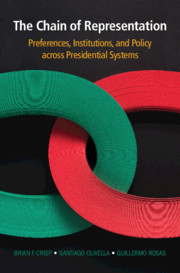The Chain of Representation Preferences, Institutions, and Policy across Presidential Systems
Langue : Anglais
Auteurs : Crisp Brian F., Olivella Santiago, Rosas Guillermo

A comparative analysis of why democratic institutions often produce dissonance between citizens' preferences and public policy in separation-of-powers regimes.
How do formal institutions affect the extent to which democracies adopt policies that reflect the preferences of their citizens? Based on a chain of representation model in which electoral rules and policy-making powers link citizens, politicians, and policies, this book reveals the conditions under which citizen preferences and implemented policies diverge. Comparative quantitative analyses encompassing eighteen Latin American countries show that presidential democracies vary greatly in the degree to which they demonstrate responsiveness to their electorates. Often, individual presidents with strong legislative powers have prompted policy changes that are unrepresentative of voter preferences. Other times, their interactions with legislatures result in more representative policies. Grounded in clear theory and thorough empirics, this study shows how rules can introduce dissonance between voters and politicians, but also how they can potentially reduce it. This is an excellent resource for scholars and graduate students interested in comparative politics, institutional design, economic policy, and Latin American studies.
1. Studying the chain of representation; 2. Our solutions to the challenges of studying the chain of representation; Part I. Stages: 3. Stage 1: citizens' preferences; 4. Stage 2: policymakers' preferences; 5. Stage 3: public policies chosen; 6. Placing preferences and policies on a common scale; Part II. Linkages: 7. Linkage 1: electoral systems; 8. Linkage 2: policymaking processes; Part III. Testing the Chain of Representation: 9. From citizens to policymakers; 10. From policymakers to policies; 11. From citizen to policies; 12. A chain is only as strong as its weakest link.
Brian F. Crisp is a Professor of Political Science at Washington University, St Louis. His work on electoral systems, legislative politics, interbranch relations, and policy choices has been published in The American Journal of Political Science, The American Political Science Review, and The Journal of Politics. He is also the Executive Editor of Legislative Studies Quarterly.
Santiago Olivella is an Assistant Professor of Political Science at the University of North Carolina, Chapel Hill. His research focuses on developing quantitative tools to study issues in electoral and legislative politics. He has published articles in Political Analysis, the American Journal of Political Science, the British Journal of Political Science, the Journal of Politics, and Electoral Studies.
Guillermo Rosas is an Associate Professor of Political Science at Washington University, St Louis. His research explores the economic consequences of political regimes and political elite behavior. He is the author of Curbing Bailouts: Bank Crises and Democratic Accountability in Comparative Perspective (2010) and co-author of Latin American Party Systems (Cambridge, 2010).
Santiago Olivella is an Assistant Professor of Political Science at the University of North Carolina, Chapel Hill. His research focuses on developing quantitative tools to study issues in electoral and legislative politics. He has published articles in Political Analysis, the American Journal of Political Science, the British Journal of Political Science, the Journal of Politics, and Electoral Studies.
Guillermo Rosas is an Associate Professor of Political Science at Washington University, St Louis. His research explores the economic consequences of political regimes and political elite behavior. He is the author of Curbing Bailouts: Bank Crises and Democratic Accountability in Comparative Perspective (2010) and co-author of Latin American Party Systems (Cambridge, 2010).
Date de parution : 03-2020
Ouvrage de 285 p.
15.2x23 cm
Date de parution : 03-2020
Ouvrage de 285 p.
15.7x23.5 cm
Thème de The Chain of Representation :
© 2024 LAVOISIER S.A.S.



